when I try to create a generic class which implement UICollectionViewDataSource in swift it say that my class does not conform to protocol (and sometime Xcode crash).
Does it mean that we can't create generic data provider for UICollectionView and that we have to duplicate code ?
Here is the generic code :
// Enum protocol
protocol OptionsEnumProtocol
{
typealias T
static var allValues:[T] {get set}
var description: String {get}
func iconName() -> String
}
// enum : list of first available options
enum Options: String, OptionsEnumProtocol
{
typealias T = Options
case Color = "Color"
case Image = "Image"
case Shadow = "Shadow"
static var allValues:[Options] = [Color, Image, Shadow]
var description: String {
return self.rawValue
}
func iconName() -> String
{
var returnValue = ""
switch(self)
{
case .Color: returnValue = "color_icon"
case .Image: returnValue = "image_icon"
case .Shadow: returnValue = "shadow_icon"
}
return returnValue
}
}
// class to use as the uicollectionview datasource and delegate
class OptionsDataProvider<T>: NSObject, UICollectionViewDelegate, UICollectionViewDataSource, UICollectionViewDelegateFlowLayout
{
private let items = T.allValues
func collectionView(collectionView: UICollectionView, numberOfItemsInSection section: Int) -> Int
{
return items.count
}
func collectionView(collectionView: UICollectionView, cellForItemAtIndexPath indexPath: NSIndexPath) -> UICollectionViewCell
{
let cell = collectionView.dequeueReusableCellWithReuseIdentifier(OptionsCellReuseIdentifier, forIndexPath: indexPath) as! GenericIconLabelCell
let item = self.items[indexPath.row]
// Configure the cell
cell.iconFileName = item.iconName()
cell.labelView.text = item.description
return cell
}
}
But because it failed I have to use this non generic form instead :
enum Options: String
{
case Color = "Color"
case Image = "Image"
case Shadow = "Shadow"
static var allValues:[Options] = [Color, Image, Shadow]
var description: String {
return self.rawValue
}
func iconName() -> String
{
var returnValue = ""
switch(self)
{
case .Color: returnValue = "color_icon"
case .Image: returnValue = "image_icon"
case .Shadow: returnValue = "shadow_icon"
}
return returnValue
}
}
class OptionsDataProvider: NSObject, UICollectionViewDelegate, UICollectionViewDataSource, UICollectionViewDelegateFlowLayout
{
private let items = Options.allValues
func collectionView(collectionView: UICollectionView, numberOfItemsInSection section: Int) -> Int
{
return items.count
}
func collectionView(collectionView: UICollectionView, cellForItemAtIndexPath indexPath: NSIndexPath) -> UICollectionViewCell
{
let cell = collectionView.dequeueReusableCellWithReuseIdentifier(OptionsCellReuseIdentifier, forIndexPath: indexPath) as! GenericIconLabelCell
let item = self.items[indexPath.row]
// Configure the cell
cell.iconFileName = item.iconName()
cell.labelView.text = item.description
return cell
}
}
which obligate me to duplicate the class for each enum type I have.
Exact error :
